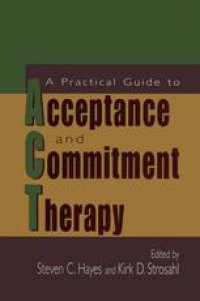
Ebook: A Practical Guide to Acceptance and Commitment Therapy
- Tags: Psychotherapy, Clinical Psychology, Psychology general, Psychotherapy and Counseling
- Year: 2004
- Publisher: Springer US
- Edition: 1
- Language: English
- pdf
Long awaited, here is the first book to apply the Acceptance and Commitment Therapy (ACT) model and its powerful techniques to a broad range of disorders and clinical settings. An innovative and groundbreaking approach, ACT cuts across the traditional categories of experiential, analytic, behavioral and cognitive therapies to utilize concepts of mindfulness and acceptance and the view that language is at the core of many psychological disorders. With the help of 26 expert contributors, ACT architects Hayes and Strosahl have expanded on their previous texts to give readers an elegant source of ideas for using this language/cognition-based method.
• A concise overview of the theory, core processes, and key therapeutic messages of ACT, plus a framework for case conceptualization using ACT.
• Techniques for using ACT to treat common behavior problems, including affective disorders, anxiety disorders, PTSD, and substance abuse/addiction. Chapters are included on clients with multiple problems and the severely mentally ill.
• Uses of ACT for stress relief, for chronic pain management, and in inpatient medical settings.
• Special chapters on children and families, and ACT with groups.
Modeling the psychological flexibility that is so crucial to treatment, chapters illustrate ACT’s adaptability to client problems as they arise, and its built-in strategies for cutting through impasses. Further, the book cogently differentiates ACT from related modes of therapy.
This user-friendly volume will be a welcome guide for practitioners and students alike. It offers both a cogent theoretical model and a clinical guide for all professionals who treat mental health problems, regardless of theoretical orientation.
Long awaited, here is the first book to apply the Acceptance and Commitment Therapy (ACT) model and its powerful techniques to a broad range of disorders and clinical settings. An innovative and groundbreaking approach, ACT cuts across the traditional categories of experiential, analytic, behavioral and cognitive therapies to utilize concepts of mindfulness and acceptance and the view that language is at the core of many psychological disorders. With the help of 26 expert contributors, ACT architects Hayes and Strosahl have expanded on their previous texts to give readers an elegant source of ideas for using this language/cognition-based method.
• A concise overview of the theory, core processes, and key therapeutic messages of ACT, plus a framework for case conceptualization using ACT.
• Techniques for using ACT to treat common behavior problems, including affective disorders, anxiety disorders, PTSD, and substance abuse/addiction. Chapters are included on clients with multiple problems and the severely mentally ill.
• Uses of ACT for stress relief, for chronic pain management, and in inpatient medical settings.
• Special chapters on children and families, and ACT with groups.
Modeling the psychological flexibility that is so crucial to treatment, chapters illustrate ACT’s adaptability to client problems as they arise, and its built-in strategies for cutting through impasses. Further, the book cogently differentiates ACT from related modes of therapy.
This user-friendly volume will be a welcome guide for practitioners and students alike. It offers both a cogent theoretical model and a clinical guide for all professionals who treat mental health problems, regardless of theoretical orientation.